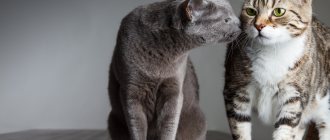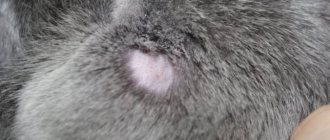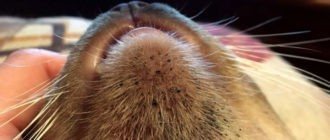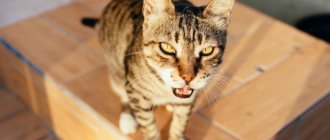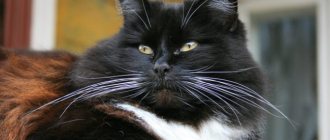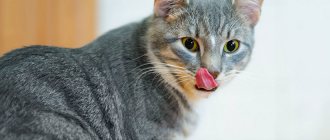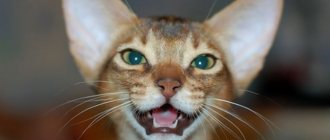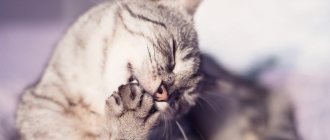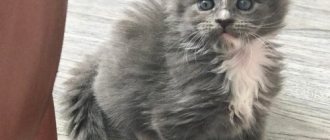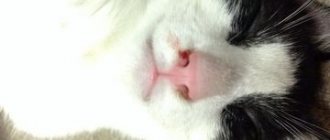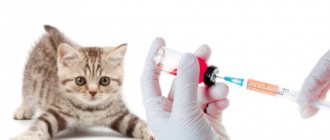11514Pavel
When a cat has a swollen belly, he needs urgent help. This condition is dangerous for the animal, not only by impaired mobility, but also by changes in the functioning of internal organs. In order to carry out timely and competent therapy, it is necessary to immediately accurately determine the cause of the unpleasant phenomenon. This is best done by a veterinarian, and it is he who should be contacted if problems with your pet’s health arise. If a cat's stomach becomes suddenly swollen, the situation requires immediate veterinary attention.
What to do?
Bloating is an abnormal enlargement of the abdominal cavity. The term usually refers to abdominal enlargement rather than simple fullness. In a cat, bloating can be a consequence of poor nutrition or a symptom of a large number of diseases, including fatal ones. The most common causes of this phenomenon are discussed below.
Coprostasis
Constipation, or coprostasis, is a blockage of the large intestine with feces. The causes of coprostasis may be the following:
- A sharp transition from mother's milk to other foods.
- Binge eating.
- Eating bones, especially heat-treated ones.
- Low protein content in the diet.
- Accumulation of hair in the gastrointestinal tract (when licking itself, the cat swallows some hair).
- Dehydration from not drinking enough.
and:
- A large number of worms.
- Prostate enlargement (in males).
- Abscess or cyst in the intestinal tract.
- Obesity.
- Problems with intestinal motility.
The norm is considered to be stool once a day. When feeding natural food, periodic absence of stool for 3 days is acceptable.
Symptoms:
- Oblong lumps can be felt in the abdomen.
- Vomiting (often with constipation from wool).
Treatment:
Table scraps and expired food
Gas formation can be caused by table scraps. It is important to remember that different foods are prepared for people and animals. Therefore, cats should not be fed “human” food. They contain spices, fat, and salt, which disrupt the functioning of the pet’s gastrointestinal tract. As a result, indigestion and flatulence appear.
The prohibition rule also applies to products that have expired. They disrupt the normal intestinal microflora, activate fermentation processes, fecal obstruction, and increased gas formation.
If it is not clear what product causes flatulence, and the cat begins to fart, then you can find out by eliminating certain foods. Once unsuitable food is identified, it is removed from the menu.
When is self-medication possible?
It is possible to treat bloating in a cat without involving a veterinarian only if there is simple flatulence in which there is no manifestation of any other disease. In other cases, an immediate visit to a veterinary clinic is necessary. Answering the question of what to do if a cat’s stomach is swollen, we can advise the following :
- Hilak Forte - Give 1 drop per 1 kg of weight once a day, until complete recovery;
- Smecta;
- Enterosgel;
- Children's espumesan.
All 3 drugs are selected in a dosage that is calculated based on the weight of the pet.
A bloated belly in a cat is a dangerous condition and its cause must be identified. This is often a symptom of a serious injury. The problem should be resolved with the involvement of a veterinarian. If the cat begins to bloat before our eyes, and there is no urinary retention, it is necessary to give medication for allergies, since this is most likely it. As soon as the attack subsides, the size of the abdomen will return back, and everything will be normal.
Prevention measures
To ensure that your pet is always healthy and does not suffer from gas, monitor its diet. Eliminate “forbidden” foods from the cat’s menu that can cause flatulence, reduce the amount of foods containing carbohydrates and fiber.
Watch how your cat eats. Eating should take place in a calm environment so that she does not swallow food. In this case, the daily feed intake should be divided into equal portions.
And under no circumstances allow your pet to dig through the trash can!
Flatulence in a pet
Gas in a cat is a common occurrence in veterinary practice. If she passes a small amount of gas 2-4 hours after eating food, this is part of the digestive process and is considered normal. About 90% of the gases released are methane, which has no odor. But if a pet farts more often than usual, and the passage of gas is accompanied by a terrible “amber” and some other signs, this already indicates that he has flatulence.
Flatulence in cats is the process of distension and bloating of the abdomen due to the accumulation of gases and air in the stomach or intestines, which the animal swallows while eating food. The unpleasant odor is the result of the release of hydrogen sulfide and other substances, and the excretion of the resulting excess through the anus is considered a normal physiological phenomenon inherent in all mammals.
Excessive gas production does not mean that a disease is developing in the cat’s body. It is likely that the four-legged pet simply ate food that was unusual for him, and his intestines did not have time to produce enzymes to digest it.
But if flatulence takes a chronic form, this indicates diseases of the gastrointestinal tract. In addition, accumulated gases put pressure on the diaphragm and make breathing difficult. This can cause shock in your pet and even death.
Why does deviation occur?
The development of the deviation is influenced by pathological and physiological factors. The first are dangerous to health and require the intervention of a veterinarian. The latter are natural, so they are easy to figure out on your own.
Hazardous factors
The presence of pathology is indicated when the abdominal muscles do not relax for more than a day, and the pet’s condition gradually worsens. This is due to the following reasons:
- Constipation
. It occurs due to intestinal spasms, improper feeding, ingestion of a foreign object, helminthiasis and the accumulation of hair in the intestines during heavy shedding. Without prompt treatment, constipation can lead to intestinal obstruction and death.
- Peritonitis
. The peritoneal mucosa becomes inflamed upon contact with gastric or intestinal contents. The penetration of foreign microflora is fraught with epithelial detachment and necrosis.
- Poisoning
. Against the background of acute intoxication, painful spasms occur in the lower part of the stomach.
- Abscess
. The danger of purulent formation in the abdominal organs lies in its rupture and subsequent blood poisoning.
- Injury
. When internal organs are damaged, their contents leak into the peritoneum. The further reaction is similar to peritonitis.
- Cholecystitis (biliary colic)
. Inflammation of the gallbladder occurs when there is excessive production of bile or the formation of stones. The patient's peritoneum hardens and excruciating pain occurs.
- Pyometra
. Purulent inflammation in the uterus appears with frequent mating, hormonal disorders and infections.
- Ascites (abdominal dropsy)
. With this disease, free fluid accumulates in the abdominal cavity. Most often this occurs as a result of poor circulation.
- Neoplasms
. The growth of the tumor is reflected in the size of the peritoneum. Most often, neoplasms occur in older animals.
- Panleukopenia (distemper)
. Infection with the virus occurs in utero, during a bite by a blood-sucking insect, or through contact with an infected animal or its biological fluids.
All these causes can be eliminated with medication. Without timely help, even simple constipation becomes dangerous.
Non-hazardous factors
An enlarged and dense belly in a cat also appears for natural reasons. These include:
- Flatulence
. A tight stomach appears when there is an excess accumulation of digestive gases. Usually this condition goes away with dietary adjustments, but sometimes it is a sign of helminthiasis, dysbacteriosis, intestinal obstruction and other diseases.
- Pregnancy
. Shortly before childbirth, the size of the uterus increases greatly. The abdominal muscles become harder to protect the kittens inside the womb. The condition returns to normal a few hours after the birth of the offspring.
- Stress
. By tensing the abdominal muscles, the pet tries to protect itself from the source of fear or unpleasant touches. This behavior is typical for animals that have suffered physical abuse.
- Obesity
. If the pet is neutered and inactive, then it quickly gains weight. This situation can be easily managed with diet and increased activity. Remember that the lack of response threatens premature death from fatty degeneration of the myocardium, that is, obesity of the heart.
Associated symptoms will help distinguish pathological factors from physiological ones. If they are detected, you must immediately contact a veterinary clinic.
Probability of death
The likelihood of death depends on the situation. The exact indicator is determined only by diagnostic results.
Remember that complications are possible even with non-hazardous factors. The bloating puts pressure on the chest, preventing normal breathing. There is also a high risk of gastric volvulus, intestinal rupture, tissue necrosis and sepsis. To avoid unpleasant consequences, contact your veterinarian if you have any alarming symptoms.
Treatment Options
Vomiting blood in a cat: reasons, what to do
If you notice a bloated belly in your kitten, it is best to make an appointment with your veterinarian to rule out the possibility of serious problems. The doctor will conduct a comprehensive examination, refer you to the necessary diagnostic procedures and select the appropriate treatment that will help get rid of the disease.
Treatment of bloating in a pet with medications
At home
What to do if a kitten’s tummy is swollen is a question that concerns all pet owners. Self-treatment for acute and cutting pain is not recommended. It may have unpleasant consequences.
You can use home therapy methods in the early stages of the development of pathology, to alleviate the animal’s condition before going to the doctor. The first step is to remove harmful and fatty foods from your cat’s diet that can irritate the intestines. These include potatoes, corn or dough.
If a small kitten has a bloated stomach and a pain, what should you do to treat the pathology?
- Hilak Forte. The drug is taken 5-6 drops per day, 1 time per day.
- Espumisan for children. The product is also calculated drop by drop, based on the total body weight of the animal. Detailed indicators are presented in the instructions for use.
Important! You should not massage your stomach yourself or do a general massage. This can lead to worsening negative symptoms.
When to go to the vet
If after 1-3 days of self-treatment the animal does not feel better, it is worth seeking medical help to prevent the development of complications.
You should urgently call a doctor in the following cases:
- the kitten has a swollen belly and does not go away within 2 days;
- vomiting and diarrhea do not stop;
- the cat is losing a lot of weight and doesn’t eat anything;
- the pet’s temperature does not drop;
- General syndromes of intoxication and fever appear.
In the above cases, urgent diagnosis is needed to exclude serious pathologies that can become a threat to the cat’s life. To do this, the doctor sends for a blood test, ultrasound or x-ray.
Features of therapy consist of the diagnosis:
- If a cat has a large belly due to intestinal obstruction and stool problems, the drug Duphalac is prescribed. It is used 2-3 times a day. As a supplement, do enemas and drink Vaseline oil 3 times a day.
- Helminthic infestation is treated with specialized antimicrobial drugs, which are selected depending on the age of the pet. The owner must also normalize the cat’s nutrition and monitor its quality of life.
- If bloating occurs as a result of an unbalanced diet, you will need drugs that can stabilize the intestinal microflora. These include “Acipol”, “Lactobacterin”.
Lactobifid for the treatment and prevention of intestinal diseases in cats
To remove waste and toxins in case of renal failure, the use of enterosorbents will be required. For example, “Polysorb”, “Smecta”, activated carbon.
Symptoms of bloating in a cat
Of course, the symptoms of bloating may seem obvious (enlarged abdomen), but it is necessary to pay attention to a number of nuances that will subsequently help in diagnosis:
- It is imperative to feel the swollen abdomen. If it is quite soft and resembles a drum, then it is probably due to flatulence. But the presence of fluid (gurgling when palpated), severe tension in the abdominal wall and severe pain are reasons for an immediate visit to the veterinarian. This is how peritonitis and other dangerous pathologies manifest themselves.
- Often severe bloating is accompanied by vomiting. Gases or other factors that cause an increase in pressure in the gastrointestinal tract simply push semi-digested food masses out.
- Very often, animals with bloating cannot relieve themselves and urinate normally. This is due to the fact that swollen intestines lose the ability to contract normally, simultaneously squeezing the bladder.
- Sudden enlargement of the abdominal cavity. As a last resort, you should seek medical help.
- There is an increase every day. This requires immediate medical examination.
- Gradual bloating. You should get tested if symptoms are accompanied by loss of muscle mass and weight, decreased appetite, vomiting or diarrhea, changes in bladder and bowel habits, or decreased activity.
When your dog is vomiting and you, not knowing what to do, are looking for advice on this topic on the Internet on forums, we recommend not to self-medicate or experiment on your beloved dog. The fact is that there are many reasons for an animal vomiting (more on this later in the article), and the consequences of your experiment may disappoint you and your family.
Reasons why a cat's tummy is swollen
Bloat can happen for many reasons, and some of them can be life-threatening for your pet.
Poor nutrition and gases
A kitten's belly may become bloated due to certain foods. Often, flatulence (accumulation of gases in the intestines) results from feeding your pet milk and dairy products (especially for adult animals).
The cause of bloating may be the high content of carbohydrates in the menu: wheat, corn, etc.
Constipation
Constipation is an accumulation of stool that becomes dry and hard and cannot be passed out on its own. This leads to intoxication of the body, and gases begin to accumulate in the intestines, which cause bloating.
Constipation occurs for many reasons:
- incorrectly composed diet;
- intestinal obstruction;
- accumulation of wool in the stomach;
- congenital anomalies;
- obesity and inactivity.
Constipation may cause bloating in cats
Swollen intestines from worms
Severe infestation of a cat with worms is another cause of flatulence or bloating.
Parasites actively multiply in the pet’s intestines and cause intoxication. Along with bloating, the cat also experiences other symptoms: vomiting, bowel irregularities, and the presence of worms in the feces. Moreover, the cat may be thin, but with a bloated intestine.
The animal eats a lot
Cats that eat very greedily and eat a lot often suffer from flatulence. At the same time, they swallow food without chewing it, which leads to large amounts of air entering the intestines and stomach. As a result, the intestines can swell to incredible sizes. Usually the animals themselves who live in shelters or nurseries eat so greedily.
Overeating leads to bloating in animals
Diseases of internal organs
Enlarged intestines can be a symptom of serious diseases of the internal organs:
- Pyometra. With this disease, pus accumulates in the cat's uterus, which is accompanied by an enlargement of the abdominal cavity. Associated symptoms: depression, fever (not always present), discharge from the loop.
- Peritonitis. An enlarged abdomen or ascites (accumulation of fluid in the abdominal cavity) accompanies the wet form of coronavirus infection (FIP).
- Tumors. The volume of the abdomen may increase significantly due to a malignant tumor in the abdominal cavity.
Bloating can occur with intestinal obstruction. This condition is life-threatening and requires immediate surgical intervention.
Some diseases can cause bloating
Causes of the problem
Flatulence has no age limits, but is more often observed in early and old age (due to helminthiasis and slow metabolism, respectively). In cats, due to their short digestive tract, bloating is rare.
Most often, the cause of flatulence should be sought in unbalanced feeding. There are a number of products that can provoke it, these include:
- Milk, since the cat's body reacts poorly to lactose, and the older the cat gets, the higher the likelihood of stomach upset from drinking this drink.
- Fermented milk products. This includes cheese, yoghurt, sour cream, cottage cheese. They are allowed in small quantities, but strictly dosed.
- Fish. If river or sea fish form the basis of the diet, the smell of your pet's excrement becomes unbearable.
- Garlic. With its help, some owners try to treat their cat for worms. However, you should not give garlic to an animal, and flatulence is not the only problem that can arise from its use.
- Cereals. Feeds high in wheat, corn, and soy irritate the digestive system and become a serious burden for it.
- Fat and meat trimmings are not a complete substitute for meat and can cause not only flatulence, but also liver dysfunction, intestinal disorders, and diarrhea.
- Bread. Contains yeast, which provokes the fermentation process in the intestines and, as a result, distension of the stomach.
We invite you to read: False pregnancy in cats: symptoms, treatment, how to identify and what to do
However, not only an incorrect diet can contribute to the development of flatulence. This can lead to:
- viral, parasitic diseases;
- inflammatory bowel diseases;
- hair stones that accumulate in the stomach (most common in cats with long hair);
- oncology;
- obstruction or partial obstruction of the intestine;
- dysbacteriosis in cats due to improper treatment (especially antibiotics).
You should contact your veterinarian if, in addition to frequent passing of gas, your pet experiences borborygmas (rumbling in the abdomen), drooling, vomiting, diarrhea or constipation, mucus in the stool, poor appetite, weight loss, bloated abdomen, or abdominal tension. Most likely, these are symptoms of inflammatory gastrointestinal diseases.
Causes
The erroneous opinion that bloating in a cat is a nonsense disease that will go away on its own as it appeared, can result in tragedy and death of the pet.
© shutterstock
The main causes of bloating are:
- Flatulence. The disease can occur for several reasons. The problem can be caused by feeding the animal low-quality food, high carbohydrate content in the food, or the cat swallowing large pieces of food with a significant amount of air. Flatulence will also appear if a fermentation process occurs in the cat’s stomach, which often accompanies digestion when the animal has eaten both dairy products and lard. The swelling is not very strong, is not painful and goes away on its own;
- Helminthic lesions. When severely infested with worms, cats often experience bloating. Such a lesion is manifested by nausea, diarrhea, vomiting in which worms come out, and directly by bloating. This condition poses a serious danger to cats and can cause death if the worms are not removed in a timely manner. When there are a lot of parasites, a general intoxication of the animal’s body occurs, which sometimes even becomes the cause of death.
- Peritonitis. One of the most dangerous causes of bloating. The disease is caused by many reasons, including coronavirus, which is incurable and leads to the death of cats in 100% of cases. If the inflammation of the peritoneum is provoked by other reasons, then there is hope to save the pet if treatment is carried out in a timely manner. The veterinarian selects antibiotics and, if necessary, performs surgery to sanitize the abdominal cavity. However, if therapy is not carried out on time, the cat also dies.
- Ascites or dropsy of the peritoneum. With pathology in cats, a large volume of fluid accumulates in the abdomen, causing bloating. There is no inflammation. The pathology can be caused by liver disease, abdominal injuries, heart disease and kidney problems, when due to this excess fluid accumulates in the body. The disease manifests itself not only by bloating, but also by decreased appetite and general lethargy of the pet.
- Tumor processes. Very often, bloating in cats is observed if there are tumors in the abdominal organs, whether malignant or benign. In addition to bloating, the cat also experiences diarrhea, vomiting and exhaustion. When the stomach is very swollen and hurts, the condition is already very serious.
- Constipation. This phenomenon very often causes bloating in cats. It can be caused by many factors and if it does not go away within 2-3 days it requires treatment. The fact that constipation is serious is indicated by bloating. It occurs due to the fact that not only feces, but also gases cannot pass through the intestines. Very often, constipation develops due to improper feeding and infection of the cat with a large number of worms. After eliminating constipation, a cat may go to the toilet very often in the beginning.
- Feline distemper. A disease caused by parvovirus. The disease is most often diagnosed in late summer and autumn. The duration of the incubation period is from 2 to 12 hours. In addition to bloating, the symptoms of such a disease are a very high temperature, vomiting, diarrhea, complete refusal to eat, although the animal is thirsty. Sick animals will lie almost motionless, and if treatment is delayed, or the owner does not do anything, the pet will die. Abdominal pain during illness is very severe. Kittens and cats up to one year of age are affected.
- Acute urinary retention. It occurs due to blockage of the lumen of the bladder and its overflow with urine if the animal is not provided with the necessary assistance. With the development of acute urinary retention, catheterization of the organ is required to prevent bladder rupture. The cat's stomach swells quickly, within one day and with very severe pain. She can't go to the toilet.
Regardless of what caused the disorder in the cat’s condition, if her bloating does not go away for more than a day, or if the disorder is accompanied by additional symptoms, an urgent trip to the veterinary clinic is required. You should not delay therapy, because for many diseases, the later it is provided, the more difficult it will be to restore your pet’s health.
© shutterstock
Disease prevention
The best method of dealing with any disease is its prevention. Preventive measures against dropsy are available to any cat breeder, the main thing is not to forget about it:
- Compliance with the diet (when preparing a diet, you can contact a veterinarian).
- Walks in the open air.
- Fortification (you can select good vitamins with the help of a veterinarian).
- Avoidance of stressful situations (cats under stress have reduced immunity).
- Preventive vaccinations, as well as treatment for worms, fleas and other parasites.
- Preventative examinations at the veterinarian.
Ascites (abdominal dropsy) is an accumulation of free fluid in the abdominal cavity, but this phenomenon cannot be called an independent disease. Typically, ascites occurs against the background of another disease as a symptom. This disease is the cause of dropsy. Therefore, treatment must be comprehensive. Veterinarians prescribe groups of drugs aimed at combating symptoms, and the underlying disease is treated separately.
What is ascites
Ascites in cats is a chronic disease associated with the accumulation of fluid in the abdominal cavity. Ascites affects internal organs and can lead to the death of the pet. The second name of the disease is abdominal dropsy. If your cat's stomach is “bloated”, she has become lethargic and weak, it is possible that she has ascites.
Ascites is dropsy, an accumulation of fluid in a cat's abdomen.
Ascites is one of the signs of any disease, so dropsy is often confused with other diseases.
Ascites (abdominal dropsy) is not considered an independent disease - it develops as a consequence of a long-standing and advanced disease (usually the liver or heart), and can also occur in indoor cats due to physical inactivity. With ascites, stagnant serous transudate, which is a filtrate of blood plasma, accumulates in the abdominal cavity of cats (mainly elderly cats, or in pampered domestic animals). In severe cases, cardiovascular failure may develop.
Veterinary reference book. Traditional and non-traditional methods of treating cats
https://medbookaide.ru/books/fold1002/book1302/p12.php#head102
Why does it appear in cats and why is it dangerous?
One of the signs of ascites in a cat is a distended belly.
Most often, dropsy occurs as a complication of some chronic disease. Therefore, the cause of the accumulation of free fluid in the peritoneum may be one of the following health conditions:
- pancreatitis or cirrhosis of the liver, liver failure;
- different types of hepatitis (chronic, cholangiohepatitis, etc.);
- renal failure;
- diseases of the cardiovascular system (for example, right-sided heart failure);
- diabetes;
- excess weight (obesity);
- improper nutrition (due to feeding salty and smoked foods, excess sodium occurs in the animal’s body);
- disturbance of water-salt or protein balance (for example, a decrease in the level of albumin, a protein synthesized by the liver);
- oncology (neoplastic growth in internal organs);
- peritonitis (bacterial, viral, fungal, etc.) and internal hemorrhages;
- bladder damage (eg, rupture);
- serious injuries.
Regarding the cause of ascites, such as heart disease, the opinions of veterinarians are divided. Some experts believe that heart failure cannot be a predisposing factor in the development of dropsy. However, there is also a theory according to which some heart problems may, on the contrary, arise as a result of ascites.
The main cause of the development of ascites in cats is VPC (FIP - viral peritonitis), much less often the cause of ascites can be malignant tumors (for example, lymphomas). Cases of ascites in cats caused by heart failure have not been described in the literature. Apparently they are extremely rare. This is confirmed by Komolov himself.
Veterinarian, forum user
https://teron.ru/index.php?showtopic=2218858
Video: ascites - veterinarian’s opinion
Water accumulated in the abdominal cavity will put pressure on the diaphragm, heart, stomach and other internal organs. This can disrupt the functioning of several body systems at once. The cat will stop eating and drinking and will not be able to move or breathe. The cat will suffocate or die from dehydration, starvation, etc. Therefore, the sooner you recognize the signs of dropsy, the greater the chance of curing the animal.
Treatment
Flatulence can be cured by eliminating from the diet a product that causes fermentation in the stomach. At home, it is recommended to use drugs such as Hilak Forte, Bifiform, Espumisan, Smecta, Enterosgel and others. Select the dosage taking into account the size and age of the cat.
Helminths are eliminated using special medications: tablets (Drontal, Pratel, Trontsil), Prazicide suspensions, Polyvercan sugar cubes, Profender drops. They must be given again after 2 weeks during treatment. Treatment of peritonitis is only symptomatic. Antibacterial and anti-inflammatory drugs must be prescribed. At the same time, the doctor will determine the true cause of the inflammatory process. For ascites, there are 2 options:
- transferring the animal to maintenance treatment (continuous injections, droppers, diuretics);
- euthanasia.
Tumors of any nature require removal. For cancerous tumors - chemotherapy, radiation. After these procedures, restorative therapy is carried out aimed at increasing immunity. For plague in cats, an antiviral agent is given and symptomatic and immunostimulating treatment is carried out. A universal treatment has not been invented to date.
Methods for treating constipation: massaging the abdomen, giving laxatives (Duphalac, Microlax enema, Normaze) and probiotics - homemade yogurt or kefir, Linex, Hilak Forte and others. If you want a long life for your pet, try to regularly examine it and pay attention to minor deviations in behavior and appetite. These simple measures will help save the life of your beloved cat.
Do cats have flatulence?
Your affectionate pet is curled up in your arms, by the way, in the body language of cats - this is a signal of trust and disposition towards you (find out here about other interpretations of cat body movements that will help owners better understand their pet), and you are in a similar relaxed state state, when suddenly your idyll is disturbed by an unpleasant fetid smell. Where could it come from?
This often happens when cats have flatulence, and about the reasons for this phenomenon, about foods that can cause flatulence in cats, and of course about how to treat and prevent excess accumulation of gases and their release with a terrible odor - we talk about all this Today we will talk in our new article...
What is flatulence
If we turn to veterinary and human medical reference books, for comparison, flatulence is the process of bloating in an animal as a result of the accumulation of gases in the intestines.
This can not be seen often, despite the fact that the release of gases for the body of animals is a completely natural process, but sometimes you can still observe an excessive accumulation of gases and their release with a terrible odor.
In addition to all this, the accumulated gases in the animal’s intestines put pressure on the diaphragm and complicate the breathing process, and if in such a situation you do not try to help it, then this can even cause the development of shock and death of the pet.
There are no age limits for such a disorder, but still, most often, flatulence is observed both in small kittens if they have a helminthic infestation, and in old animals whose metabolic processes in the body are disrupted as a result of old age - find out how a cat’s body ages and about the duration of her life.
Bloating in a cat due to flatulence
So that you have no doubt that your cat really has flatulence and not some other disease, we suggest that you familiarize yourself with the characteristic symptoms of this disorder.
So, the cat behaves restlessly, meows pitifully and tries to attract your attention, or, on the contrary, hides in a dark corner and sits there, showing no signs of life.
When you pick her up, she behaves restlessly, her stomach feels swollen, hard and painful, the cat has a poor appetite or refuses to eat at all.
The processes of defecation and release of gases at the initial stage of the disease are quite frequent, but then they become less frequent until they disappear completely. This stage of the asymptomatic course of the disease is very dangerous, because if the animal is not helped in time, it may die.↑
What can cause such symptoms? The answer to this question, first of all, should be sought in the animal’s diet. So, it turns out that there are a number of products that can provoke the occurrence of such a disorder, and you yourself, without meaning to, can become the culprit of your pet’s illness.
Despite the fact that many of us think that milk is a real cat product, you and I are still mistaken. Moreover, the cat's body is lactose intolerant. And, the older the cat gets, the higher the percentage of the likelihood of developing intolerance.
No, of course, there are exceptions to the rules, but most cats still do not like milk, and those that drink it later suffer from it, paying with flatulence, indigestion and other unpleasant symptoms.
So, limit your pet’s consumption of milk - it’s for his benefit.↑
Dairy products may cause flatulence
It happens that cats tolerate milk well, but their bodies react poorly to other dairy products.
We suggest you read: The cat has diarrhea with blood, what happened?
Therefore, you just need to be patient and observant in order to determine which of the dairy products - cheese, cottage cheese, sour cream, yogurt, the cat digests without problems, and which one causes him/her bloating with all the ensuing consequences .
When you identify a product that catalyzes the flatulence reaction, you should exclude it from your pet’s diet completely, or at least limit its use and reduce it to a minimum - after all, cats, like people, simply adore what they shouldn’t and causes harm to them. health.↑
There are meat cats, and there are fish cats. By the way, according to the owners of mustachioed striped ones, there are more of the latter. However,
No matter how much your cat loves fish, no matter what type of fish you offer him - sea or river, in no case should fish products form the basis of a cat's diet.
If you ignore these recommendations and constantly feed your cat fish, then prepare to have serious problems with your pet’s health in the future, against the background of which flatulence will seem not the worst thing that could happen to him.
You should not believe that garlic is a folk remedy for worms and can be used to treat helminthic infestations in cats. While this folk remedy helps people, it is forbidden to give garlic to cats in any form. So, avoid this food additive if you do not want to encounter flatulence in your pet and other problems related to its health.↑
Many cat owners are ready to brag for hours about the fact that their cat is absolutely omnivorous, and even eats grain products. But there are few reasons and reasons for joy in this.
We should not forget that cats, by their primitive nature, are still predators, and nature, when creating them, provided that they should eat meat.
Therefore, a diet high in soy, corn, and wheat irritates the digestive system of your purring friend and becomes a serious burden for it.↑
When should you contact a veterinarian to treat your cat?
If your pet exhibits symptoms such as vomiting, pain, and drooling along with a bloated belly, you should consult a veterinarian.
The doctor will prescribe the necessary tests and examinations (blood tests, ultrasound, x-rays, etc.), after which he will prescribe the appropriate treatment:
- A pathological condition such as pyometra requires immediate surgical intervention. During the operation, the doctor carefully removes the uterus along with the pus that has accumulated in it.
- If the abdomen has become enlarged due to infectious peritonitis, the doctor will prescribe supportive treatment: antibiotics and corticosteroids. Also, with the wet form of FIP, the fluid that accumulates in the abdomen is periodically pumped out.
- If a cat has an obstruction, the doctor will prescribe an immediate operation, during which the root cause of this condition (foreign body, tumor, etc.) will be eliminated.
Bloating does not always indicate a serious pathology.
In most cases, flatulence is the result of an incorrectly composed diet. The accumulation of gases in the intestines causes discomfort to the pet, so it is necessary to provide assistance to the animal as quickly as possible.
Diagnosis and treatment
Therapy is aimed at eliminating the cause of bloating. Symptomatic treatment is prescribed.
If the doctor determines that flatulence is caused by poor nutrition, then he prescribes an appropriate diet. Your cat's food should consist of foods low in carbohydrates.
What to do and how to help your cat before visiting the clinic? As first aid, you can give her a cleansing enema (if you know how) and give her the following medications:
- Traumeel (to relieve spasms).
- Activated carbon, Polysorb (to remove gases).
- Lactoferon (to avoid the development of putrefactive microflora).
- Liarsin (to normalize the digestion process).
Homeopathic remedies (Nux vomica-homaccord, Engistol) have proven themselves well in the treatment of flatulence and intestinal disorders. Dill water helps, as well as infusions of cumin, chamomile, and fennel.
What to do to eliminate the pathology?
If the cause of bloating is constipation, then the drug Duphalac will help to cope with the problem.
If the kitten's sides are swollen due to a severe internal illness, the doctor will hospitalize the pet and, if necessary, perform surgery. In other cases, you can deal with the problem at home. For constipation, you can give your pet the drug Duphalac and use microenemas. Vaseline oil will help improve digestion; its dosage is 0.1 ml per 100 g of weight. It is recommended to give the product 2-3 times a day.
If the cat's swollen sides are a sign of helminthic infestation, in this situation antihelminthics will help normalize the condition. Doctors at the Zoovet clinic point out that not every drug is intended for kittens aged 2-3 months. Therefore, the veterinarian must select the medicine, taking into account the baby’s age, the degree of invasion and other individual characteristics.
After giving birth, the cat's abdomen will return to its normal position without special treatment. The problem of overeating is easy to eliminate. Often, increased appetite is associated with a lack of vitamins and other elements in the body. Therefore, it is better to feed your cat with ready-made food, where all the ingredients are balanced and selected for a certain age.
How to call a veterinarian at home?
What questions will need to be answered? In order to call a veterinarian, you need to:
- Call the operator at the numbers specified in the Contacts section;
- Tell what happened to the animal;
- Provide the address (street, house, front door, floor) where the veterinarian will arrive;
- Specify the date and time of the doctor’s arrival
Call a veterinarian at home and he will definitely help you. At home, as they say, walls can be healed.
Diseases that cause bloating
A swollen, hard tummy occurs in pets due to various diseases. Diagnosis should be carried out by a doctor, but it doesn’t hurt to know the characteristic symptoms.
Liver failure
Why does a kitten's whiskers break: the main reasons and what to do
If a one-month-old kitten has a hard and bloated tummy, you should think about liver problems. It could be hepatitis or cirrhosis. The disease can be identified by yellowing of the whites of the eyes, a regular increase in body temperature and loss of appetite. With cirrhosis of the liver, an animal experiences diarrhea, vomiting, flatulence and loss of appetite. In such cases, the abdominal cavity swells and hurts.
Oncological diseases
If the cat has a large belly, but he is thin, you should think about cancer. Such pathologies are usually found in adult cats, but every year the oncology becomes younger and appears even in newborn cats. In the initial stages of development, cancer may be asymptomatic. It does not cause significant symptoms. The only warning sign is your pet's protruding belly. Over time, weakness, loss of appetite and weight appear. Given the baby's low body weight, the belly is too large.
Additional symptoms include: pain, digestive problems, enlarged lymph nodes that can be felt in the form of balls under the skin.
Important! In the final stages of cancer, the pet loses a lot of weight and spends almost 95% of all time in passive mode.
Infectious peritonitis
If the kitten has a large and hard tummy, this may be a sign of developing peritonitis. This is one of the most dangerous diseases of the gastrointestinal tract, which is accompanied by an inflammatory process of the abdominal organs. In addition to an enlarged belly, the pet develops regular diarrhea, profuse vomiting, fever, and increased body temperature.
Pancreatitis
If a kitten has a swollen belly, this may indicate the development of pancreatitis. The pathology is accompanied by severe pain radiating to the side, spasms and bloating. The cat loses its appetite, sleeps poorly and becomes thin.
A large belly in a cat that regularly lives outdoors may indicate pregnancy. In such cases, the physical health of the animal remains virtually unchanged. Good appetite and drowsiness are noted.
Helminthiasis
An animal that has not undergone preventive treatment for more than 3–12 months is guaranteed to be infected with worms. The only question is their number and size. In kittens born on the streets, by the age of one month, severe bloating is observed in the abdomen, due to the active reproduction of parasites that “huddle” into a ball. An adult animal can also carry hundreds of worms, which multiply, grow and take up more and more space, stretching the walls of the stomach and intestines.
Note! If you pick up a cat on the street, most likely it will have both worms and flatulence.
Give your pet deworming medication as quickly as possible and repeat the procedure after 14 days. Many medications for kittens contain a gentle active ingredient that paralyzes parasites but does not harm their eggs.
